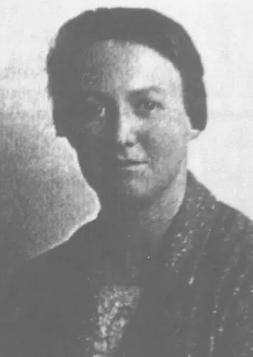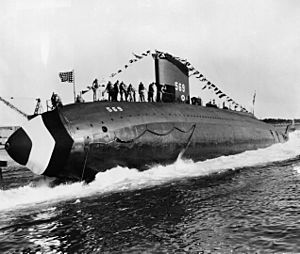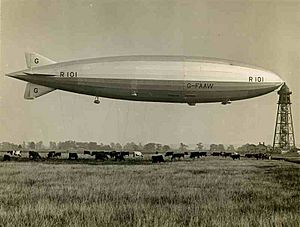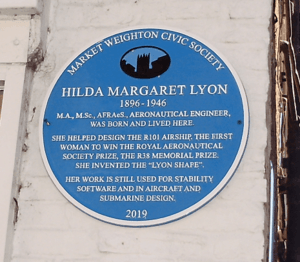Hilda Lyon facts for kids
Quick facts for kids
Hilda Margaret Lyon
|
|
|---|---|
 |
|
| Born | 31 May 1896 Market Weighton, Yorkshire, England
|
| Died | 2 December 1946 (aged 50) Surrey, England
|
| Nationality | British |
| Education | Newnham College, Cambridge |
| Engineering career | |
| Employer(s) | Siddeley-Deasy, George Parnall, Royal Airship Works |
| Projects | R101 |
| Significant design | "Lyon Shape" |
| Awards | R38 Memorial Prize |
Hilda Lyon (born May 31, 1896 – died December 2, 1946) was a talented British engineer. She is famous for inventing the "Lyon Shape." This was a special streamlined design. It was used for airships and submarines to help them move smoothly through air or water.
Early Life and Education
Hilda Lyon was born in 1896 in a town called Market Weighton in Yorkshire, England. She was the youngest daughter of Thomas and Margaret Lyon. Her father worked as a grocer, selling food and household items.
Hilda went to Beverley High School. After that, in 1915, she went to Newnham College, Cambridge. There, she earned a Master of Arts (MA) degree in mathematics.
Career in Aviation
After finishing college, Hilda took a course from the Air Ministry. This course taught her how to analyze the stress on aeroplane parts. She then got a job as a technical assistant. However, she felt that as a woman mathematician, she wouldn't get promoted or have more important roles. So, she and her sister decided to quit their jobs and travel to Switzerland for six weeks.
In 1918, Hilda Lyon started working as an Aircraft Technical Assistant for a company called Siddeley-Deasy. Later, in 1920, she moved to George Parnall & Co..
Around 1922, Hilda became an Associate Fellow of the Royal Aeronautical Society. This was a big achievement for an engineer. From 1925, she joined the technical team at the Royal Airship Works in Cardington. Here, she helped to develop the R101 rigid airship. Her work focused on aerodynamics, which is the study of how air moves around objects.
In 1930, Hilda Lyon received the R38 Memorial Prize from the Royal Aeronautical Society. She won it for her paper titled "The Strength of Transverse Frames of Rigid Airships." This was a very important moment because she was the first woman ever to win any prize from this society.
Hilda's work also involved traveling to other countries. In 1930, she went to America on a special scholarship. She studied at the Massachusetts Institute of Technology (MIT). At MIT, she was allowed to use a wind tunnel for the first time. Wind tunnels are used to test how air flows around models of aircraft. In 1932, she earned her Master of Science (MSc) degree. Her thesis was about "The Effect of Turbulence on the Drag of Airship Models."
After her studies in America, Hilda traveled to Göttingen in Germany. There, she did research at the Kaiser Wilhelm Gesellschaft für Strömungsforschung with a famous scientist named Ludwig Prandtl.
When she returned to Britain, Hilda spent some time at home caring for someone. But she still continued her research. She used libraries at the University of Hull and the University of Leeds. She also visited the National Physical Laboratory and the Royal Aircraft Establishment. During this time, she worked on topics like aeroelastic flutter and elastic blades.

From 1937, Hilda Lyon returned to full-time aerodynamic research. She worked as a Principal Scientific Officer at the Royal Aircraft Establishment in Farnborough. She first worked with wind tunnels, studying how to reduce drag using boundary layer suction. Later, she joined the Stability Section and eventually became its head. She also served on the Aeronautical Research Council.
Hilda Lyon passed away on December 2, 1946, after an operation. After her death, her research and the "Lyon Shape" she created became very important. The American submarine USS Albacore used her streamlined hull design. This design became the model for almost all US submarines that came after it.
Commemoration
Hilda Lyon's life story was published by the Oxford Dictionary of National Biography in May 2019. This was part of their support for the Women's Engineering Society's 100th anniversary. A new book has also been published about her life and work.
On June 27, 2019, a blue plaque was put up in Hilda's honor. It is located in Market Weighton at the site of her father's old grocery shop.
St Mary's Church in Beverley, East Yorkshire, also plans to honor Hilda Lyon. In 2021, they announced they would add a stone carving of her. This is part of a project to celebrate important women in the restoration of the medieval church's stonework. Other women to be honored include engineer Amy Johnson, Mary Wollstonecraft, Mary Seacole, Marie Curie, Rosalind Franklin, Helen Sharman, and Ada Lovelace.



